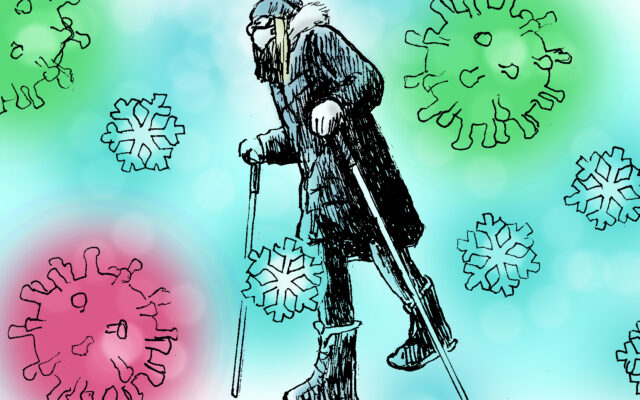
Facing another COVID Winter, Mainers should be thankful for science and entrepreneurship
By Timothy Templet
Winter is coming, and so is a potential COVID surge. Expected to continue for years, COVID winters are making long hospital waits the new normal, with doctors and nurses scrambling to meet demand for care.
Now more than ever, Mainers need to practice vigilance, applying the best practices that we learned from the pandemic. This means testing, testing, and more testing.
As we brace for another COVID winter, it is important to recognize that we are in a much better position to navigate public health crises than before. This is in large part due to the private sector and the ingenuity of entrepreneurs within the scientific community, which produces medical breakthroughs on a regular basis. Scientific experts make these breakthroughs possible by pushing the limits of discovery, thereby allowing the rest of us to remain vigilant.
Case in point: I recently attended the Association for Molecular Pathology’s Annual Meeting & Expo (AMP 2023) in Salt Lake City, Utah, the world’s “premier gathering” of molecular professionals.
Why is that important? What do I even mean by “molecular pathology” or “molecular diagnostics”? Simply put, molecular pathology is the study of disease at the molecular level, including molecules found in organs, tissues, and even bodily fluids. Molecular diagnostics refers to the process of determining the link between certain symptoms and the type of disease involved.
The study of molecules comes with extremely relevant, real-life applications. Molecular diagnostic tests work by determining whether or not the coronavirus is actively infecting an individual. For years, COVID testing has been made possible by molecular diagnostics, with polymerase chain reaction (PCR) and other nucleic acid amplification tests (NAATs) — all molecular by nature — detecting genetic material called “RNA” from the novel virus.
We have the field of molecular pathology to thank for the millions upon millions of COVID tests that have been distributed across the United States since March 2020. And, working for North America’s largest manufacturer of COVID-19 testing swabs, I know a thing or two about tests. Especially with COVID’s winter surge upon us, it is important to recognize the process behind COVID testing — and the countless lives those tests saved.
Take Maine Medical Center, where testing services for more than 22,000 employees protected workers while also providing life-saving care to many of our state’s residents. This is the sort of science that we must continue to cherish, even if the worst days of COVID are presumably behind us.
The private sector will continue to lay the foundation for society’s collective preparedness. Supported by government allies at the federal, state, and local level, companies in molecular pathology and similar industries represent our sustained heartbeat of caution and vigilance against diseases known and unknown. The principles of entrepreneurship and innovation will make it possible for the U.S. healthcare system to address and overcome present or future threats to public health.
There is more to entrepreneurship and innovation than the bottom line, while that remains important. Entrepreneurs and innovators in fields like molecular pathology work around the clock to discover new-age solutions to lingering problems. They make great sacrifices to achieve key medical breakthroughs, as we all saw with COVID testing in 2020.
That matters because our challenges are not going away. The world’s population is aging, and more people are suffering from chronic diseases as a result. They are also more vulnerable to COVID, not to mention other diseases to come. According to the United Nations, there were more than 727 million people aged 65 or above in 2020. By 2050, that number will cross 1.5 billion, inevitably leading to an increased number of age-specific diseases. Imagine if an even more dangerous pandemic comes then.
On the bright side, we can expect a larger number of early diagnoses and treatments to emerge in the years to come. Industries and entire economies adapt, and that bodes well for the people who benefit from the likes of molecular diagnostics. By 2030, the molecular diagnostics market will amount to nearly $50 billion, growing by about 6 percent each year.
What was a COVID test yesterday will be a new breakthrough tomorrow, so Mainers should feel optimistic today. At Puritan, we certainly do, playing our own role by making products like Molecular Preservative, which simplifies specimen collection and preservation for molecular research — one of the first steps toward final “breakthroughs.”
We don’t know how the next COVID surge will affect us. We don’t know when the next pandemic will strike, or the toll it may take. Nor do we know the full extent of the global aging problem. But, what we know is that solutions will come, if we trust in entrepreneurship and innovation.
We know that human beings will adjust because we are resilient people. And Mainers are the most resilient of all.
Templet is executive vice president of global sales at Puritan Medical Products, which is headquartered in Guilford.